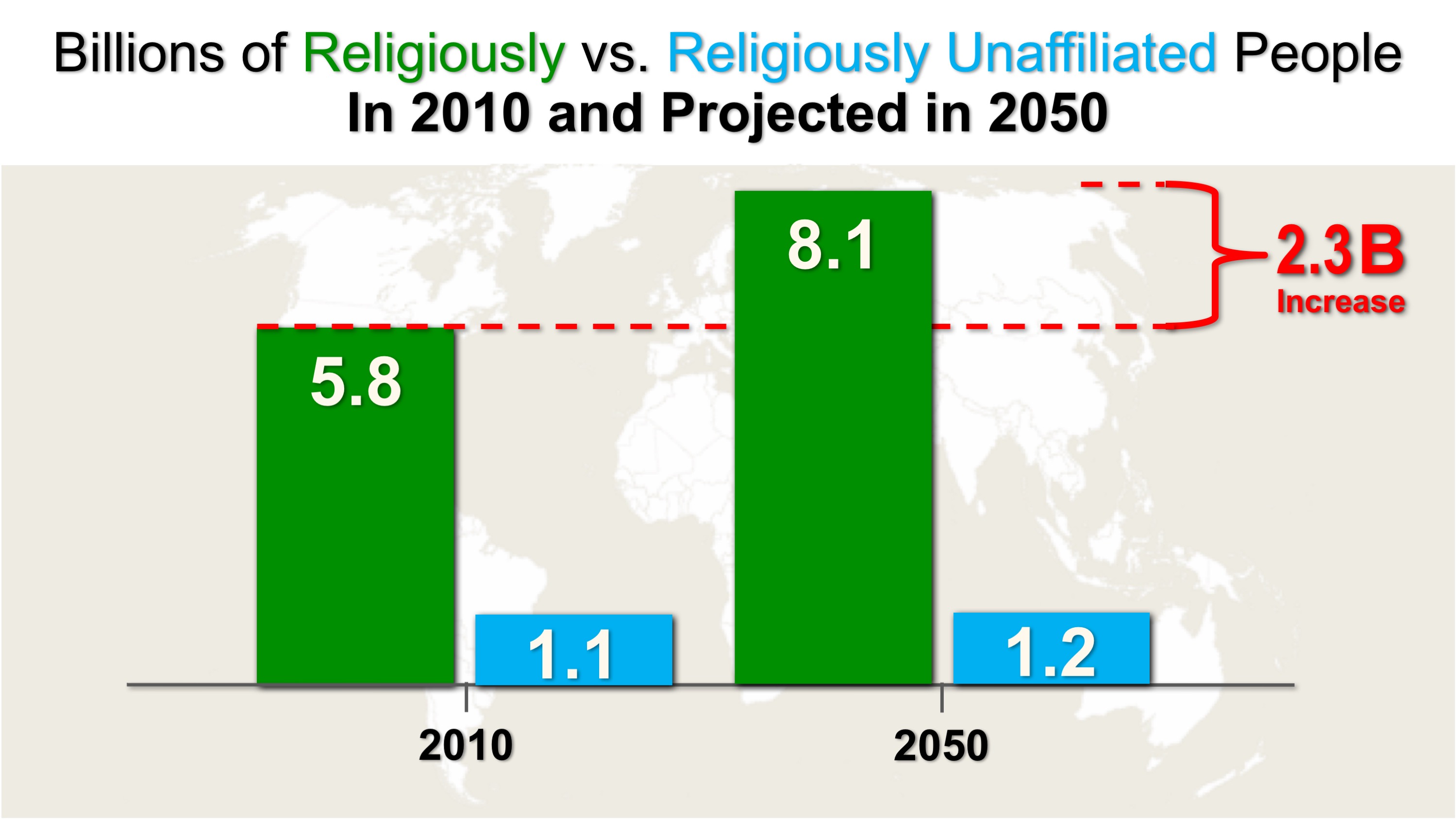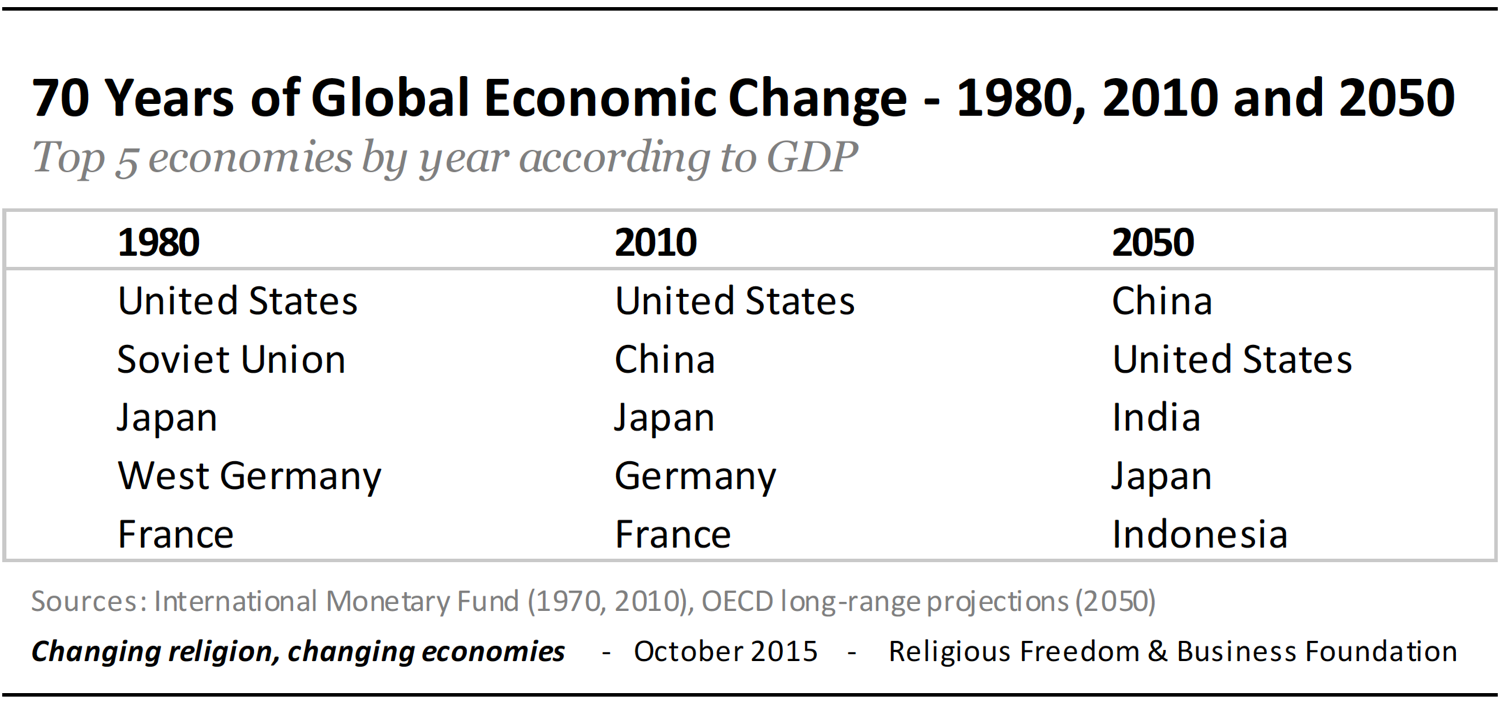 Brian Grim’s Introduction: We live in a world where religious populations will dramatically outgrow religiously unaffiliated populations. According to the Pew Research Center, the global religiously affiliated population is projected to grow by 2.3 billion between 2010 and 2050 compared with almost no growth in the religiously unaffiliated population (about 0.1 billion). This is more than a 23-fold difference in favor of religious populations. That’s like religion “winning” 23-to-1.
Brian Grim’s Introduction: We live in a world where religious populations will dramatically outgrow religiously unaffiliated populations. According to the Pew Research Center, the global religiously affiliated population is projected to grow by 2.3 billion between 2010 and 2050 compared with almost no growth in the religiously unaffiliated population (about 0.1 billion). This is more than a 23-fold difference in favor of religious populations. That’s like religion “winning” 23-to-1.
 This religious growth is also changing the global marketplace. Today, three of the top five economies are Christian-majority. But in 40 years, only one is projected to be. The other four top economies in 2050 will include countries where Hindus, Muslims, Buddhists and the unaffiliated predominate.
This religious growth is also changing the global marketplace. Today, three of the top five economies are Christian-majority. But in 40 years, only one is projected to be. The other four top economies in 2050 will include countries where Hindus, Muslims, Buddhists and the unaffiliated predominate.
 Research shows that this religious growth can be good for the workplace and the bottom lines of businesses –– as long as it is accompanied by respect for freedom of religion or belief by governments and societies. In such countries, innovative strength is more than twice as high as in countries where governments and societies don’t respect freedom of religion or belief.
Research shows that this religious growth can be good for the workplace and the bottom lines of businesses –– as long as it is accompanied by respect for freedom of religion or belief by governments and societies. In such countries, innovative strength is more than twice as high as in countries where governments and societies don’t respect freedom of religion or belief.
So, freedom to believe – or not believe – is good for business. We can see this in the world’s two largest economies.
 First, China. Admittedly it is perhaps a counter-intuitive example. During the Cultural Revolution of the 1960s and 1970s, religion was completely outlawed and people were routinely beaten and killed for having superstitious or religious beliefs. While it is true that today China has very high government restrictions on religion relative to other countries in the world, current conditions are far less restrictive than they were in the 1960s and 1970s. Today, China has the world’s largest Buddhist population, largest folk religionist population, largest Taoist population, 9th largest Christian population and 17th largest Muslim population – ranking between Yemen and Saudi Arabia (Pew Research Center 2012). It is undeniable that had the Cultural Revolution’s draconian restrictions on religion and all segments of society continued, China’s economic progress would not have been possible.
First, China. Admittedly it is perhaps a counter-intuitive example. During the Cultural Revolution of the 1960s and 1970s, religion was completely outlawed and people were routinely beaten and killed for having superstitious or religious beliefs. While it is true that today China has very high government restrictions on religion relative to other countries in the world, current conditions are far less restrictive than they were in the 1960s and 1970s. Today, China has the world’s largest Buddhist population, largest folk religionist population, largest Taoist population, 9th largest Christian population and 17th largest Muslim population – ranking between Yemen and Saudi Arabia (Pew Research Center 2012). It is undeniable that had the Cultural Revolution’s draconian restrictions on religion and all segments of society continued, China’s economic progress would not have been possible.
 Second, the U.S. Religion annually contributes nearly $1.2 trillion of socio-economic value to the U.S. economy. That is equivalent to being the world’s 15th largest national economy, putting it ahead of about 180 other countries. — It’s more than the annual revenues of the world’s top 10 tech companies, including Apple, Amazon and Google. — And it’s also more than 50% larger than that of the annual global revenues of America’s 6 largest oil and gas companies. So – you might say – that represents a lot of spiritually inspired fuel being pumped into the U.S. economy.
Second, the U.S. Religion annually contributes nearly $1.2 trillion of socio-economic value to the U.S. economy. That is equivalent to being the world’s 15th largest national economy, putting it ahead of about 180 other countries. — It’s more than the annual revenues of the world’s top 10 tech companies, including Apple, Amazon and Google. — And it’s also more than 50% larger than that of the annual global revenues of America’s 6 largest oil and gas companies. So – you might say – that represents a lot of spiritually inspired fuel being pumped into the U.S. economy.
Religion-related and religion-friendly business add about $438 billion to the US economy each year. These include faith-based businesses, ranging from the Halal and Kosher food industries to religious media such as EWTN and the Christian Broadcast Network. The largest group within this sector are not religious companies, per se, but are faith-inspired or religion-friendly companies. Tyson’s Foods, for example, employs a large force of chaplains for their multi-religious workforce.
Many Companies Engaging
Tyson Foods isn’t the only company that’s religion-friendly or that has religious roots. Walmart came out of the Evangelical culture of Arkansas – at the time one of the most rural and least technologically advanced U.S. States. Ted Malloch notes that although the commercial success of Walmart is well known, “less well known are Walmart’s connections to the distinct religious world of northwest Arkansas and rural America … [and its] corporate culture and how specific executives incorporated religious culture into their managerial philosophy” (2015: 82). For a full discussion of the religious roots of Walmart, see Bethany Moreton’s Harvard book (2009).
Ethos of the company
Worldwide, a number of companies adhere to a religious or belief-based ethos. For instance, Sanitarium, the most popular breakfast cereal company in Australia, is owned and operated by the Seventh Day Adventist Church. As a practical demonstration of the Church’s doctrinal dedication to health and well-being, Sanitarium is a South Pacific leader in producing healthy products and in organizing community programmes to encourage healthy lifestyles.
One such Sanitarium programme is their popular nationwide TRYathlons, which inspire children to get moving in a friendly and supportive environment with an emphasis on enjoying the experience as part of an active lifestyle rather than competition.
In fact, breakfast cereals in general have Adventist roots. The parent company of Sanitarium was Sanitas, the original company set up by then-Adventists John Harvey and W.K. Kellogg to manufacture toasted corn flakes as a healthier alternative to the greasy American breakfasts of the day. And now you know the religious roots of Kellogg’s Corn Flakes!
Religious Diversity & Inclusion
Major global companies are adding religion as part of diversity and inclusion programs. Recently, EY created an online program, Religious Literacy for Organizations, winning EY UK Chairman Steve Varley a Global Business & Interfaith Peace Award at a March 2018 gala keynoted by former UN Secretary-General Ban Ki-moon, with the collaboration of the UN Global Compact.
Bloomberg, DTCC and The Walt Disney Company are sponsoring the 3rd Annual Tanenbaum Religious Diversity Leadership Summit on May 10 at Bloomberg headquarters in New York. At the summit I will discuss the global traction of the Corporate Pledge on Religious Diversity & Inclusion, which has a growing number of signatories including the CEOs of Hyundai Elevator, Berkshire Capital, The Edmond de Rothschild Foundations, Yuhan-Kimberly and the Mizan Group, Indonesia’s largest Muslim publisher.
Religion, not just religious diversity and inclusion, also animates business leaders. Here, at the annual Horasis Global Meeting of business and world leaders, five CEOs will share with their peers how their faith inspires and animates their work in business. And faith is a consistent topic at the annual World Economic Forum meeting in Davos, ranging from special sessions on the power of faith to informal events like the Davos Shabbat initiated by the late Israeli President and Prime Minister Shimon Peres.
A question Davos has yet to address
Today at the annual Horasis Global Meeting of business and world leaders, five CEOs, each from a different faith tradition (Catholic, Confucian, Evangelical, Mormon and Muslim), shared with their peers how faith inspires and animates their work in business. This is an issue the annual meeting of the World Economic Forum in Davos has yet to take up.
Brian Grim will moderate.
Many global events seem beyond control and ultimately affect people locally. People become disillusioned, and without hope fall prey to despair and populism. How may we develop trust, faith and togetherness to enable inspirational progress that can develop economic, political and spiritual change? Businesses by and large are secular, but how are they impacted and inspired by religion?
- – King Husein, Chief Executive Officer, Span Construction & Engineering, USA
- – James Kong, Assistant Secretary General, The World Federation of Confucius Descendents, Hong Kong
- – Don Larson, Founder and Chief Executive Officer, Sunshine Nut Company, Mozambique
- – Ali Ahmad Makahleh, Chief Executive Officer and Founder, 3Du, Jordan
- – Fleur D. S. Spari, Chairperson, Mahrberg Group, Liechtenstein
- – Chaired by Brian J. Grim, President, Religious Freedom & Business Foundation, USA
